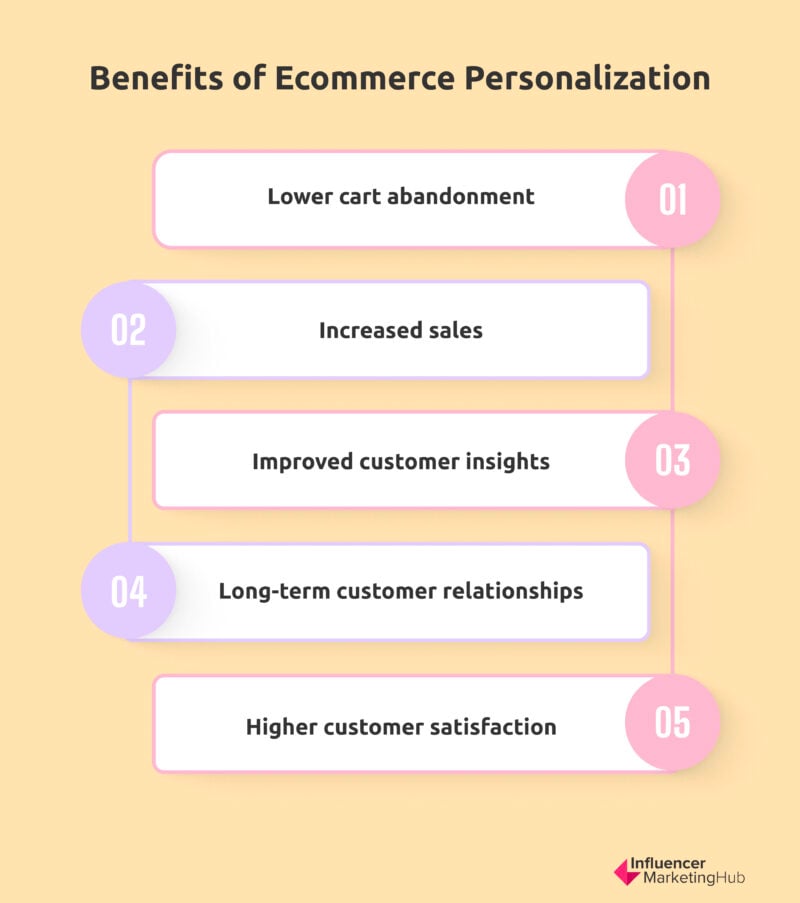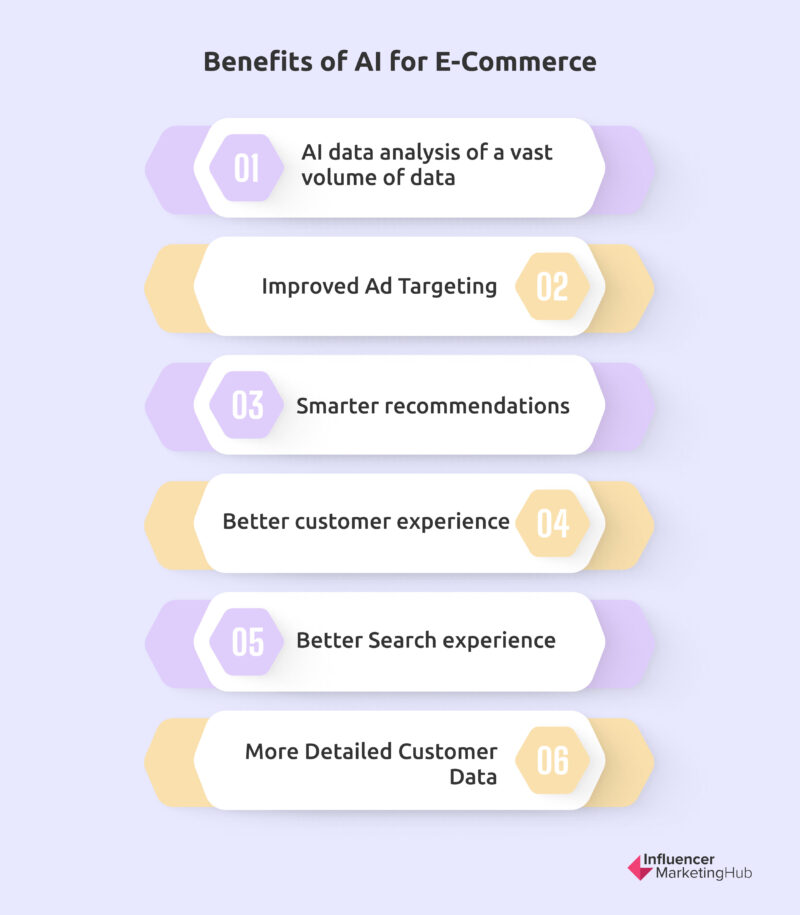Over the past decade, eCommerce has experienced tremendous growth, particularly evident in the US market. Projections suggest a significant rise to $1.4 trillion by 2027 domestically, with global retail e-commerce sales expected to reach $7 trillion by 2025. Specifically, between 2023 and 2027, forecasts indicate a remarkable increase of $509.4 billion in the US eCommerce market, showcasing an impressive growth rate of 54.19%.
Considering these data, eCommerce is growing without a doubt, but the growth also leads to a wide range of choices that cause consumer fatigue. Customers with thousands of options eventually choose nothing, causing 70% of shopping carts to be abandoned.
Furthermore, the highly competitive eCommerce industry compels brands to offer better shopping experiences if they want consumers to pick them among a sea of similar competing products.
To address both fronts, eCommerce stores turn to personalized shopping experiences. Personalization is the key to capturing new users and driving repeat purchases. With the advancement of AI solutions, eCommerce stores are poised more than ever to offer an exceptional shopper experience.
AI Personalization Tools for eCommerce
Multiple AI personalization tools in the market are designed to help you provide a personalized shopping experience. Here are the best of them.
- Insider: Insider empowers top global brands like IKEA and MAC Cosmetics to create seamless, personalized cross-channel experiences by predicting customer behavior with an AI-powered engine.
- Bloomreach: Bloomreach accelerates eCommerce growth for brands like Bosch and Puma by delivering AI-driven personalized search, content management, and marketing automation for millions of customers.
- MoEngage: MoEngage boosts eCommerce conversions for over 1,200 brands by using AI insights to craft personalized, customer-centric campaigns across multiple channels.
- Clerk.io: Clerk.io leverages AI to drive a 15-30% sales uplift for brands like Jeep and Carlsberg by offering tailored product recommendations, search results, and cross-channel experiences.
- Vue.ai: Vue.ai enhances profitability for retailers like Diesel and Nordstrom through AI-powered catalog management and dynamic 1:1 personalization, enabling unique and efficient customer journeys.
The Role of AI Personalization in eCommerce Growth:
Insider provides individualized, cross-channel experiences that help marketers connect multiple customer data from different channels and predict their behavior using an AI-powered engine. This enables them to create personalized shopping experiences that carry on to various customer touchpoints such as the website, social media channels, and messaging apps. Top brands like IKEA, MAC Cosmetics, Estee Lauder, Burger King, Toyota, and Samsung use Insider, making them the leading personalization platform with a global presence across five continents. Bloomreach is an eCommerce experience cloud that creates unique customer journeys for millions of customers at the same time. It has an AI-powered Discovery feature that makes personalized search and merchandising, a robust content management system, and marketing automation solutions. Using the tool, eCommerce companies can grow and scale through lightning-speed AI optimizations and revenue-driven customer journeys. Brands using Bloomreach include Bosch, Puma, and Marks & Spencer. MoEngage is an award-winning platform that uses AI-driven insights to provide customers with relevant and engaging cross-channel experiences. It helps marketers create customer-centric campaigns that leverage customer data to determine the best content, channel, and time to reach a customer. This creates a winning formula that guarantees increased reach and conversions leading to explosive eCommerce growth. MoEngage delivers 2.2 billion omnichannel experiences monthly and is used by over 1,200 brands. Clerk.io is an eCommerce personalization software that uses AI-driven technology to acquire, convert, and retain customers. Through AI, it can automatically analyze customer behavior, determine trends, and review past transactions to show current shoppers relevant product recommendations and search results. It also powers email marketing and cross-channel experiences to generate a 15-30% sales uplift. Brands like Jeep, Carlsberg, Stylepit, and Unisport trust Clerk.io to power their eCommerce personalization strategies. Vue.ai is an end-to-end eCommerce personalization platform that uses AI for catalog management, image moderation, model imagery, styling, dynamic 1:1 personalization, and shopper journeys. It helps retailers run efficient online stores and provide unique customer journeys that increase sales and drive profitability. Notable brands that use Vue.ai include Diesel, Nordstrom, Columbia, and Johnson & Johnson. The platform also lets you create customized AI models to match your business goals and needs. 1. Insider

2. Bloomreach

3. MoEngage

4. Clerk.io

5. Vue.ai

Benefits of eCommerce Personalization

Personalization is crucial for engaging shoppers, increasing repeat purchases, and boosting conversions. It’s a tried and tested strategy to drive sales and comes in many forms, such as personalized product recommendations and onboarding quizzes.
Personalization provides tailored experiences to shoppers that are relevant to their needs and better suited to their tastes. Instead of asking shoppers to mindlessly scroll through thousands of products to find the perfect match, personalization uses customer data to predict the most likely item they’d buy based on past purchases, browsing behavior, demographic data, and other data points.
By offering personalized shopping experiences, eCommerce brands experience the following:
Lower Cart Abandonment
Cart abandonment is a significant challenge in e-commerce, often resulting from a disconnect between what the customer wants and what the store delivers during the checkout process. By integrating advanced personalization techniques, you can address this issue head-on. Personalized product recommendations based on browsing history, dynamic offers tailored to individual preferences, and a seamless, intuitive checkout process can transform the shopping experience.
When customers see products and offers that resonate with their unique tastes and needs, they are more likely to feel a sense of urgency and relevance, which encourages them to complete their purchases. This reduction in cart abandonment not only boosts immediate sales but also enhances overall customer satisfaction, as shoppers experience a smoother, more engaging path to purchase.
Increased Sales
Personalization isn't just a buzzword—it's a powerful strategy that directly influences sales outcomes. By leveraging data-driven insights to present the most relevant products to each visitor, you create a highly targeted shopping experience that drives action. Personalized recommendations increase click-through rates as customers encounter items that align with their interests.
This relevance extends to conversion rates, as tailored experiences lower the barriers to purchase. Furthermore, by implementing effective cross-selling and upselling strategies—such as suggesting complementary products or higher-value alternatives—you can increase the average order value. This personalized approach ensures that every interaction is an opportunity to boost revenue, turning casual browsers into committed buyers.
Improved Customer Insights
The true value of personalization extends beyond immediate sales—it’s a window into the minds of your customers. Personalization platforms continuously gather and analyze data on customer behavior, preferences, and interactions, offering a goldmine of insights. By diving into this data, you can identify patterns and trends that reveal what motivates your customers, which products resonate most, and how they prefer to engage with your brand.
These insights are invaluable for refining your marketing strategies, optimizing product offerings, and enhancing the overall customer experience. With a deeper understanding of your audience, you can make informed decisions that drive long-term growth and customer satisfaction.
Long-Term Customer Relationships
In today’s competitive market, building lasting customer relationships is essential for sustained success. Personalization plays a crucial role in fostering these relationships by creating a sense of connection and loyalty. When customers feel that your brand understands and caters to their individual needs, they are more likely to develop trust and affinity towards your business.
Consistently delivering personalized experiences—whether through tailored content, offers, or communications—reinforces this connection, making customers feel valued and understood. Over time, this strengthens their loyalty, leading to repeat purchases and enthusiastic word-of-mouth recommendations. Personalized experiences turn one-time shoppers into lifelong advocates for your brand.
Higher Customer Satisfaction
Customer satisfaction is the cornerstone of any successful business, and personalization is key to achieving it. When customers receive a shopping experience that feels uniquely tailored to them—featuring relevant content, product recommendations, and special offers—they are more likely to be satisfied with their experience. This sense of personalized care not only enhances their immediate satisfaction but also builds a lasting positive impression of your brand.
As a result, customers are more inclined to return, less likely to churn, and more likely to recommend your store to others. High customer satisfaction, driven by personalization, is a critical factor in maintaining strong customer retention and loyalty, ultimately leading to a more robust and profitable business.
The Role of AI Personalization in eCommerce
As an ecommerce business owner, you know that providing personalized experiences is key to engaging customers, driving sales, and building loyalty. But with vast amounts of customer data to process, how can you deliver the tailored experiences your customers crave? The answer lies in artificial intelligence (AI).
AI is revolutionizing ecommerce personalization, enabling you to analyze customer data at scale and deliver highly relevant, individualized experiences. By leveraging AI-powered tools and techniques, you can:
- Gain deep insights into customer preferences and behaviors by analyzing browsing history, purchase patterns, demographics, and social media data
- Craft detailed customer profiles that reveal preferences, purchase triggers, and potential churn factors
- Offer targeted product recommendations based on each customer's unique interests and past interactions
- Deliver personalized content and marketing messages that resonate with individual customers Provide a seamless, engaging shopping experience that keeps customers coming back
Advantages of Using AI Personalization

AI-powered personalization has several advantages over using basic personalization methods in eCommerce.
- AI mines and reads vast volumes of data so brands can access deeper insights leading to better and more accurate personalized customer journeys.
- AI improves ad targeting, leading to more effective ads that reduce marketing spend and increase revenue.
- AI generates smarter personalized recommendations for products that will go well with a customer’s current purchase leading to higher upsell revenues.
- AI-powered chatbots go beyond robotic, scripted responses and use NLP, sentiment analysis, and other AI techniques to provide shoppers with a better customer support experience.
- AI creates a better search experience by understanding the nuances of human language so it can display relevant results even if customers don’t type the exact keywords.
- AI provides important customer data that helps brands refine their offers and processes to solve customer pain points and deliver an optimal customer experience.
While personalization has been around for a long time, artificial intelligence has elevated it to a new level, delighting customers and brands. Customers will find online shopping engaging once more rather than stressful, and brands will deliver a better shopping experience that boosts revenue.
Use Cases of AI Personalization in eCommerce
Personalization is expected by 56% of customers, with 69% of consumers open to using AI to boost their experiences. That said, here are common use cases of AI personalization for eCommerce.
Optimizing eCommerce Homepage
Providing a personalized user journey right from the beginning is beneficial. First-time visitors behave differently than returning customers, and using AI can help generate a unique experience for each.
For new visitors you have no historical data on, you’d probably show them your general Top Selling items. On the other hand, you have a wealth of information about returning users, such as their past purchases, favorite categories, and browsing history, so you can tailor-fit their homepage to what they expect to see.
You can show returning visitors the items they left on the cart, sale times from their favorite categories, or their recent browsing history. This will create a unique personalized journey encouraging them to purchase more.
Revolutionizing Category Pages
If you run a big eCommerce site, you’d probably organize your products into numerous categories – from general to specific sub-categories. It may be difficult for customers to navigate these product categories to find the items they need. With the help of AI personalization, you can guide each shopper to precisely the right categories and sub-categories and display associated products that work well together.
For example, if you run an online fashion store, you’d have categories for Blouses, Dresses, Pants, and more. With AI, you can further enhance these categories to include Blouses for different seasons or styles, helping customers find exactly what they want.
Enhancing Customer Engagement on Product Detail Pages
When a shopper looks at a product’s detail page, they are interested in knowing more about the item and whether it fits their needs. You can use this information to guide them further and seal the deal. Using AI personalization tools, you can show alternatives to what the customer is viewing so that they can make a better decision by comparing available options.
You can also show Frequently Bought Together items to give a better user experience by suggesting complimentary products they’d probably need with their purchase. These tactics will keep the customer engaged with your site longer and prevent them from bouncing to other shops that offer a complete experience.
Maximizing Sales on Cart and Checkout Pages
Now that the customer is about to complete his purchase, you can still introduce AI-powered suggestions to increase the cart value. Based on what they have in the cart, you can suggest often-bought-together items or products that match their purchase. For example, if they bought an electronic device, you can offer a protective case or batteries.
If it’s a recurring customer purchasing items they bought before, AI can detect if they’ve left something out and make a suggestion to remind them to add these items to their cart.
Optimizing Customer Retention Through Thank You Pages
The Order Confirmation or Thank You page is still a good place to introduce several AI-powered suggestions to enhance the customer experience. You can show trending items related to the customer’s purchase to pique their interest and help them discover new things. You can also show frequently purchased items with their order in case they missed something.
And if the customer saves items in their wish list, you can remind them about it by showing those items and related ones on the confirmation page.
eCommerce stores are ripe with data that can be utilized to make the customer shopping experience engaging, stress-free, and fun. In every step of the shopping journey, you can use AI to display relevant products and help customers find the items they need.
Final Thoughts
Artificial intelligence is the future, and it’s enhancing every aspect of our digital world. It’s the solution to the overwhelming choices now possible with eCommerce technology and the key to delivering an exceptional customer experience that drives revenues.
As the industry gets more competitive, eCommerce personalization becomes even more crucial in acquiring and retaining customers. With AI personalization tools, brands can tailor-fit their products, promotions, and content for the right audience at the right time, strengthening brand loyalty and increasing brand relevance.
Frequently Asked Questions
How is AI used in personalized shopping?
AI is used in personalized shopping to provide customized experiences to customers based on their preferences, interests, and behavior.
AI algorithms analyze vast amounts of customer data such as purchase history, browsing behavior, and search queries to provide personalized product recommendations, promotions, and search results. Additionally, AI-powered chatbots and virtual assistants can act as personal stylists, asking customers about their preferences and suggesting personalized recommendations.
By leveraging AI technology, retailers can improve customer satisfaction, increase sales, and gain a competitive advantage in the ever-changing retail landscape.
What are the advantages of AI in personalized shopping?
AI offers several advantages in personalized shopping. AI helps retailers automate the personalization process, reducing the time and resources required to tailor experiences for each customer manually. This allows retailers to scale personalization efforts, making it feasible to provide customized experiences for a large customer base.
With AI, retailers can discover patterns in customer behavior that may not be immediately apparent. This will enable them to provide recommendations and promotions that match customers' interests and preferences, even if they have not explicitly stated them.
Most importantly, AI enables retailers to provide tailored experiences that improve customer satisfaction and nurture loyalty while increasing sales and revenue.
What is an example of personalization in eCommerce?
Product recommendations are a common application of AI personalization in eCommerce. For example, if a customer has recently purchased a pair of running shoes, the website may suggest other running-related products, such as workout clothes, fitness trackers, or running headphones. This personalized recommendation saves the customer time by showing them products they are likely interested in and increases the likelihood of a purchase.
Another application is personalized promotions. For instance, if a customer regularly purchases skincare products, the website may offer them a discount on a new skincare line. This personalized promotion incentivizes the customer to make a purchase and shows them that the retailer values their loyalty and interests.
What types of data does AI use for personalization?
AI utilizes various data types, including browsing history, purchase patterns, demographic information, and social media interactions, to create detailed customer profiles and insights.
What are the benefits of implementing AI personalization in eCommerce?
The benefits include increased customer satisfaction, higher conversion rates, improved customer loyalty, and the ability to scale personalization efforts across a large customer base.
Can AI predict customer preferences?
Yes, AI can predict customer preferences by analyzing historical data and identifying patterns in behavior, allowing businesses to anticipate what products or services a customer might want next.
What challenges are associated with AI personalization?
Challenges include data privacy concerns, potential algorithmic bias, and the risk of overly intrusive personalization, which can lead to customer discomfort.
What role do AI chatbots play in personalization?
AI chatbots can enhance personalization by acting as virtual assistants that engage with customers, gather preferences, and provide tailored recommendations or support based on individual needs.


